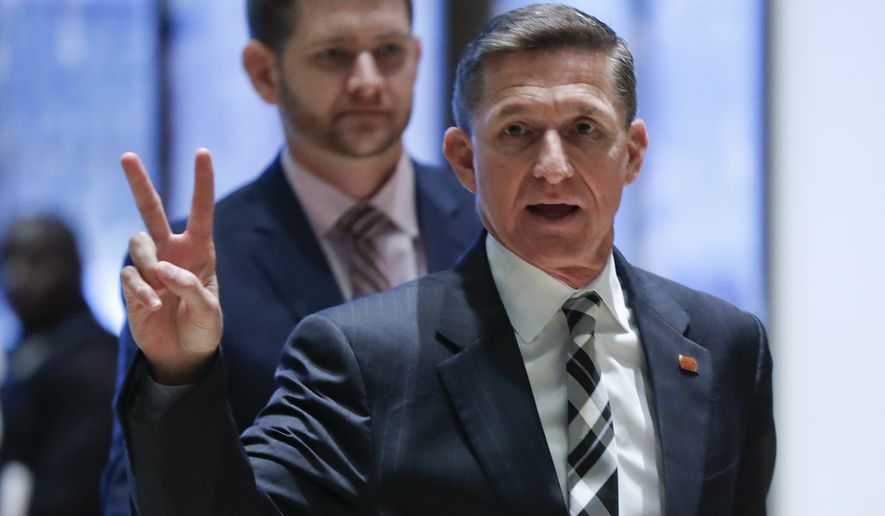The White House said Wednesday that President Trump isn’t considering pardons for former aides Michael Flynn and Paul Manafort in the special counsel’s investigation, pushing back against a report that a lawyer for the president broached the possibility of pardoning both men.
White House press secretary Sarah Huckabee Sanders said there “no discussion or consideration” of presidential pardons for Mr. Manafort, the former Trump campaign chairman under indictment, and Flynn, the president’s first national security adviser who pleaded guilty to lying to the FBI.
“The president has the authority to pardon individuals, but you’re asking me about a specific case in which it hasn’t been discussed so I would not have brought that up with him,” Mrs. Sanders told reporters. “There would be no reason for me to have had a conversation with the president about that, because that is currently not being discussed at the White House.”
The New York Times reported Wednesday that John Dowd, who quit last week as the leader of the president’s outside legal team, raised the possibility of pardons in talks with attorneys for Mr. Manafort and Flynn last summer, before either man was charged by special counsel Robert Mueller.
Mr. Dowd is quoted in the article denying that he ever discussed pardons with the lawyers for Flynn or Mr. Manafort.
Ty Cobb, the White House lawyer handling Mueller’s Russia probe, said in a statement: “I have only been asked about pardons by the press and have routinely responded on the record that no pardons are under discussion or under consideration at the White House.”
SEE ALSO: House Dems seek subpoena for Paul Manafort’s Pentagon documents
Another outside lawyer for the president, Jay Sekulow, said he has never “had any discussions of pardons of any individual involved in this inquiry.”
Flynn has agreed to cooperate with the special counsel’s probe, while Mr. Manafort maintains his innocence on charges of money laundering, fraud and other crimes related to his work as a political consultant for a pro-Russia political party in Ukraine.
Shortly after Flynn pleaded guilty, the president was asked by reporters whether he was considering a pardon for him.
“I don’t want to talk about pardons for Michael Flynn yet. We’ll see what happens. Let’s see,” the president said in December.
He added at the time, “I feel badly for Gen. Flynn. He’s led a very strong life and I feel very badly. I will say this, Hillary Clinton lied many times to the FBI. Nothing happened to her. Flynn lied and they destroyed his life. I think it’s a shame.”
Mr. Trump has used a presidential pardon for political ally Joe Arpaio, the former sheriff from Arizona who is a hard-liner on illegal immigration. Mr. Arpaio had been convicted of disobeying a judge’s order against racial profiling.
Mr. Mueller’s team also has indicted and accepted guilty pleas from former Trump campaign aides George Papadopoulos and Rick Gates.
Sen. Mark Warner of Virginia, the top Democrat on the Senate Intelligence Committee, has said the pardoning of witnesses in the Mueller probe would cross a “red line.”
“Any attempt by this president to remove special counsel Mueller from his position or to pardon key witnesses in an effort to shield them from accountability … would be a gross abuse of power,” Mr. Warner said last December. “These are red lines, and we simply cannot allow them to be crossed.”
The president has the authority to pardon anyone he wants. But issuing pardons for a corrupt reason, such as protecting himself from a criminal investigation, would be obstruction of justice, some legal scholars say.
• Dave Boyer can be reached at dboyer@washingtontimes.com.




Please read our comment policy before commenting.